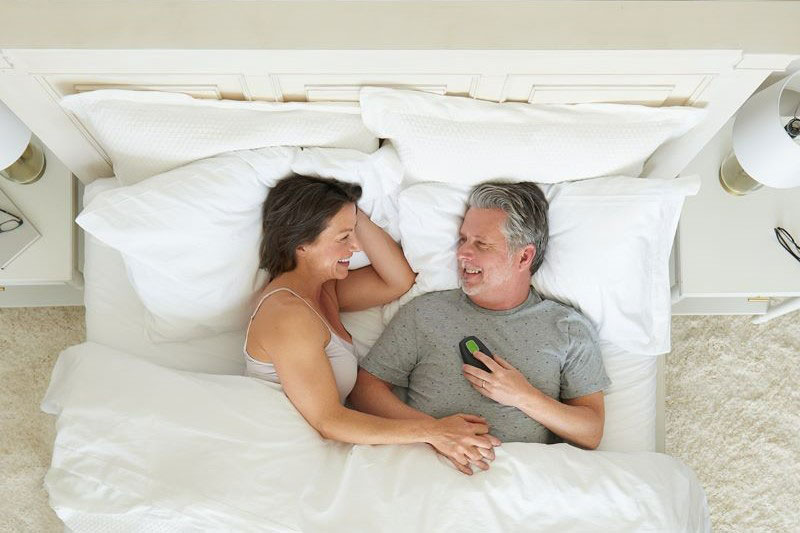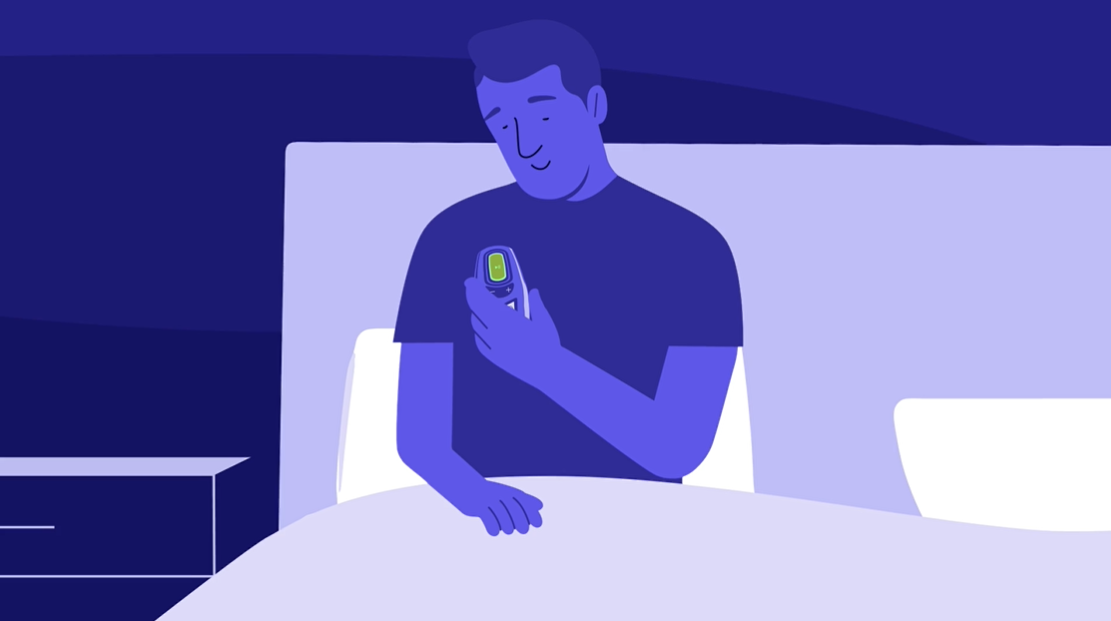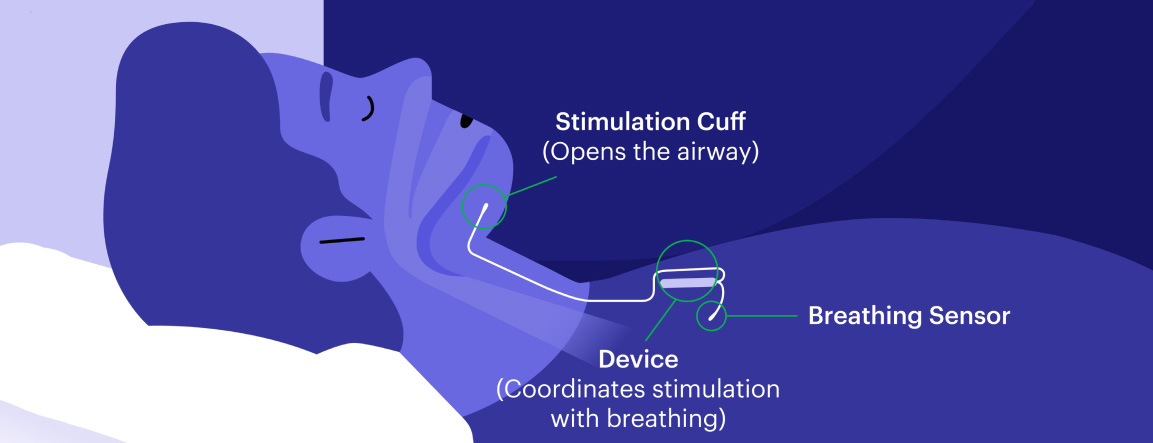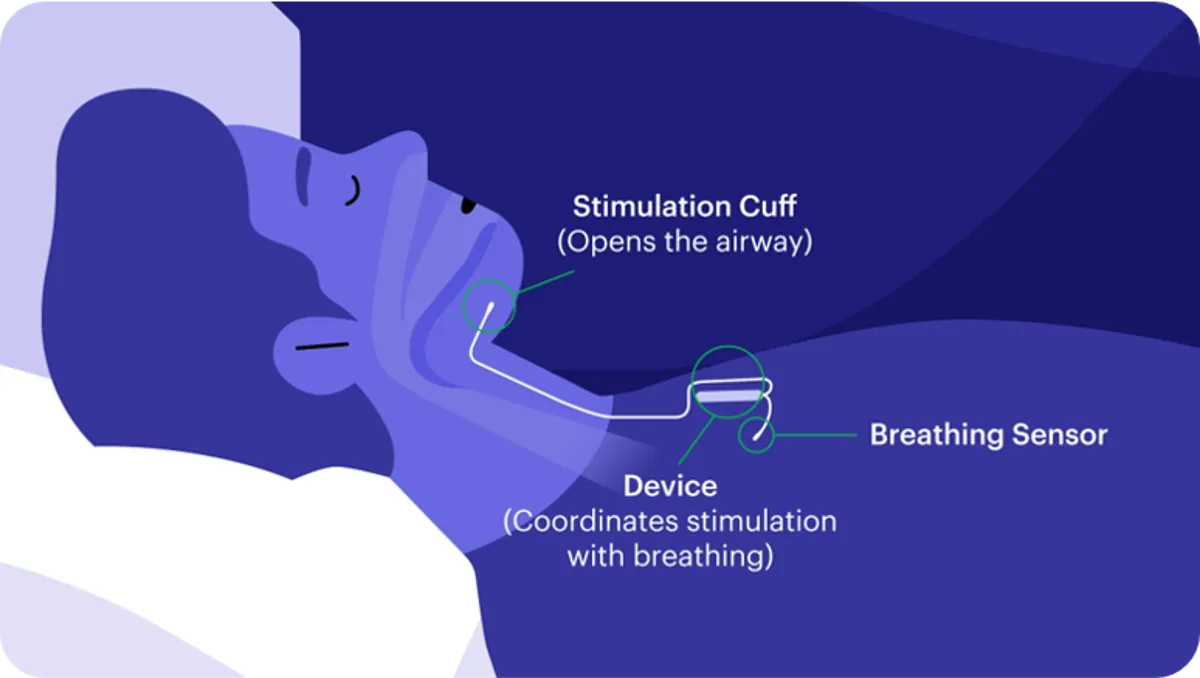No mask. No hose. Just Sleep.™
Hypoglossal nerve stimulation works inside your body to treat the root cause of sleep apnoea with just the click of a button.

What is Hypoglossal Nerve Stimulation?
Hypoglossal Nerve Stimulation (HGNS) targets the root cause of Obstructive Sleep Apnoea (OSA).
It works by stimulating the hypoglossal nerve, which controls key muscles in the airway. This stimulation prevents airway collapse, allowing you to breathe naturally during sleep.

Patient outcomes with HGNS (ADHERE Registry)
90%
of bed partners report no snoring or soft snoring.²
93%
of patients recommend Inspire therapy to a friend or family member.³
79%
reduction in sleep apnea events.²
91%
of patients say Inspire therapy is better than CPAP.³
How It Works
Based on your unique breathing patterns, the device delivers mild stimulation to the hypoglossal nerve, which controls the movement of your tongue and other key airway muscles. By stimulating these muscles, the airway remains open during sleep. With a handheld remote, you can easily turn the therapy on before bed and off when you wake up


You Might Be a Candidate For HGNS Therapy if..
- You have moderate to severe OSA.
- CPAP therapy hasn’t worked or isn’t tolerable for you.
- You are not significantly obese.
- You are age 18 or above.
Private Insurance Applies
If you are considering HGNS therapy you can consult an HGNS-trained doctor to understand the costs and reimbursement process in detail.
Many major insurance providers have approved this treatment on an individual basis. For those without private insurance coverage, the doctor may also provide information about other funding options.

HGNS Therapy in Singapore
Singapore offers advanced HGNS therapy, through world-class specialists and hospitals. With cutting-edge facilities and experienced sleep-trained doctors, patients can expect safe and effective treatment. Many private insurance plans cover HGNS therapy, check with your provider for details.
- Singapore General Hospital
- National University Hospital
- Sengkang General Hospital
- Khoo Teck Puat Hospital
- Tan Tock Seng Hospital
- Gleneagles Hospital
- Mount Elizabeth Hospital
- Farrer Park Hospital
- Woodlands Health Campus
HGNS Therapy in Singapore
Singapore offers advanced HGNS therapy, through world-class specialists and hospitals. With cutting-edge facilities and experienced sleep-trained doctors, patients can expect safe and effective treatment. Many private insurance plans cover HGNS therapy, check with your provider for details.
Head of Otorhinolaryngology at SingHealth Duke-NUS Sleep Centre, is a leading expert in Sleep Apnea Surgery, trained at Stanford, and holds a Master’s in Sleep Medicine. Renowned for pioneering Transoral Robotic Surgery in Southeast Asia, he is a prolific researcher, author, and international speaker on sleep apnea and it’s surgical treatments.
Dr. Shaun Loh, an ENT surgeon at The ENT Voice & Snoring Clinic in Gleneagles Hospital, Singapore, specializes in treating snoring and obstructive sleep apnea (OSA), offering advanced therapies such as robotic surgery and hypoglossal nerve implants. Formerly Chief of Sleep Surgery at SGH, he trains regional ENT specialists in OSA treatment. A clinical assistant professor and award-winning physician, he continues to provide expert care at multiple hospitals in Singapore.
Dr. Crystal Cheong, a consultant at NUH leading the sleep subspecialty clinic and specialises in holistic care for sleep disorders, including obstructive sleep apnea. Trained in Sleep Medicine and Surgery at the University of Pennsylvania, she combines medical and surgical expertise. A clinical lecturer at NUS, she is dedicated to patient-centered care.
Dr. Han Hong Juan, an ENT surgeon at The ENT Voice & Snoring Clinic in Mount Elizabeth Hospital, is a pioneer in advanced treatments for obstructive sleep apnea, including being among the first in Singapore to use Transoral Robotic Surgery and perform Inspire hypoglossal nerve stimulator implants. Specializing in snoring, sleep apnea, and voice and swallowing disorders, he offers a personalized, multidisciplinary approach encompassing weight management, dental appliances, CPAP, and surgery.
Dr. Phua Chu Qin, Director of Sleep Surgery at Sengkang General Hospital, is a fellowship-trained sleep surgeon specializing in obstructive sleep apnea. She completed advanced training in Sleep Surgery under Professor Toh Song Tar and Craniofacial Surgery in Taiwan, along with certifications in Transoral Robotic Surgery and Hypoglossal Nerve Implantation. Known for innovative approaches, she developed a tele-myofunctional therapy app to improve access to snoring treatments and is integrating AI into therapy monitoring through a SingHealth grant.
Dr. Paul Mok, an MOH-accredited ENT specialist with over 20 years of experience, specialises in voice, swallowing disorders, and obstructive sleep apnea. Formerly Head of ENT at Alexandra and Khoo Teck Puat Hospitals and Deputy Chairman of Khoo Teck Puat’s Medical Board, he is currently practising at My ENT Specialist and serves as Chairman of the Singapore Academy of Medicine Chapter of ENT Surgeons. A passionate educator and visiting consultant at multiple hospitals, Dr. Mok is recognized for his expertise in treating a broad range of ENT conditions, including nasal, sinus, ear, and head and neck disorders.
Dr. Lau Hung Tuan, an international fellowship-trained ENT specialist in Singapore currently practising in My ENT Specialist, specializes in snoring and obstructive sleep apnea (OSA), providing personalized, holistic care. A graduate of University College London with distinctions, he completed advanced training in Craniofacial Sleep Surgery at Chang Gung Memorial Hospital, Taiwan. Formerly a Consultant and clinical lead for Snoring and OSA Surgery at Khoo Teck Puat Hospital, Dr. Lau continues to manage complex sleep cases as a visiting specialist at Tan Tock Seng Hospital.
Dr. Leonard Soh, an Otolaryngology specialist with a Medical Degree and Masters from the Yong Loo Lin School of Medicine, NUS, focuses on Sleep Surgery for sleep-disordered breathing. After completing a rigorous 5-year residency and achieving board certification, he has contributed to research, publications, and medical education. Dedicated to providing high-quality care, Dr. Leonard is committed to advancing the field of sleep surgery while mentoring and sharing knowledge with others in the medical community.
Dr. Chong, a Senior Consultant at Tan Tock Seng Hospital, specialises in sleep medicine and obstructive sleep apnea surgery. With advanced training in transoral robotic surgery under Professor Claudio Vicini in Italy and a Master’s in Sleep Medicine from the University of Oxford, he combines clinical expertise with innovative care.
Dr. Tan, an Otolaryngology specialist with a focus on Sleep Medicine and Surgery, practices both general ENT and sleep disorder management. A graduate of NUS Yong Loo Lin School of Medicine, he obtained his Specialist Accreditation in 2015 and has led the ENT Sleep Service at Khoo Teck Puat Hospital since 2015. He was the first in Singapore to receive an HMDP for training in hypoglossal nerve stimulation for OSA at UPMC in the USA. In addition to his clinical work, Dr. Tan is involved in medical education, serving as faculty for NUS, NTU, and the NHG ENT Residency program, and is part of the team building Woodlands Health.
Frequently Asked Questions
HGNS treats the root cause of OSA by ensuring the airway stays open, unlike CPAP, which simply applies external pressure.
As with any medical procedure, HGNS therapy carries some risks. Potential risks include infection at the implant site, temporary tongue weakness, discomfort from the device, or nerve irritation. Discuss these risks with your doctor to determine if HGNS is right for you.
HGNS implantation is minimally invasive, with most patients recovering quickly and experiencing improved sleep quality soon after activation.
Many major insurance providers have approved this treatment on an individual basis. Consult an HGNS-trained doctor to understand the costs and reimbursement process in detail.
The HGNS device, such as Inspire therapy, is designed to last for many years. However, the battery may require replacement after approximately 10 years, which involves a minor procedure.
1 ADHERE Registry: Data on file
2 Suurna MV, Steffen A, Boon M, et al. Impact of Body Mass Index and Discomfort on Upper Airway Stimulation: ADHERE Registry 2020 Update. Laryngoscope 2021; 131(11): 2616-2624
3 Bosschieter et al. Similar effect of hypoglossal nerve stimulation for OSA in five disease categories. J Clin Sleep Med. 2022 Jun 1;18(6):1657-166.
801-050-000, Rev W
Disclaimer: Hypoglossal Nerve Stimulation (HGNS) is not for everyone. It is a surgically implanted system that is intended to treat obstructive sleep apnoea in patients who are not effectively treated by, or able to tolerate CPAP. Talk to your doctor about risks, benefits and expectations associated with Hypoglossal Nerve Stimulation (HGNS). Risks associated with the surgical implant procedure may include infection and temporary tongue weakness. Some patients may require post implant adjustments to the system’s settings in order to improve effectiveness and ease any initial discomfort they may experience.

No mask. No hose. Just sleep.™
Hypoglossal nerve stimulation works inside your body to treat the root cause of sleep apnoea with just the click of a button.

What is Hypoglossal Nerve Stimulation?
Hypoglossal Nerve Stimulation (HGNS) targets the root cause of Obstructive Sleep Apnoea (OSA).
It works by stimulating the hypoglossal nerve, which controls key muscles in the airway. This stimulation prevents airway collapse, allowing you to breathe naturally during sleep.
Patient Outcomes with HGNS (ADHERE Registry)
90%
of bed partners report no snoring or soft snoring.²
93%
of patients recommend Inspire therapy to a friend or family member.³
79%
reduction in sleep apnea events.²
91%
of patients say Inspire therapy is better than CPAP.³

How It Works
Based on your unique breathing patterns, the device delivers mild stimulation to the hypoglossal nerve, which controls the movement of your tongue and other key airway muscles. By stimulating these muscles, the airway remains open during sleep. With a handheld remote, you can easily turn the therapy on before bed and off when you wake up

You Might Be a Candidate For HGNS Therapy if..
- You have moderate to severe OSA.
- CPAP therapy hasn’t worked or isn’t tolerable for you.
- You are not significantly obese.
- You are age 18 or above.

Private Insurance Applies
If you are considering HGNS therapy you can consult an HGNS-trained doctor to understand the costs and reimbursement process in detail.
Many major insurance providers have approved this treatment on an individual basis. For those without private insurance coverage, the doctor may also provide information about other funding options.
HGNS Therapy in Singapore
Singapore offers advanced HGNS therapy, through world-class specialists and hospitals. With cutting-edge facilities and experienced sleep-trained doctors, patients can expect safe and effective treatment. Many private insurance plans cover HGNS therapy, check with your provider for details.
- Singapore General Hospital
- National University Hospital
- Sengkang General Hospital
- Khoo Teck Puat Hospital
- Tan Tock Seng Hospital
- Gleneagles Hospital
- Mount Elizabeth Hospital
- Farrer Park Hospital
- Woodlands Health Campus
HGNS Therapy in Singapore
Singapore offers advanced HGNS therapy, including Inspire, through world-class specialists and hospitals. With cutting-edge facilities and experienced sleep-trained doctors, patients can expect safe and effective treatment. Many private insurance plans cover HGNS therapy, check with your provider for details.
Head of Otorhinolaryngology at SingHealth Duke-NUS Sleep Centre, is a leading expert in Sleep Apnea Surgery, trained at Stanford, and holds a Master’s in Sleep Medicine. Renowned for pioneering Transoral Robotic Surgery in Southeast Asia, he is a prolific researcher, author, and international speaker on sleep apnea and it’s surgical treatments.
Dr. Shaun Loh, an ENT surgeon at The ENT Voice & Snoring Clinic in Gleneagles Hospital, Singapore, specializes in treating snoring and obstructive sleep apnea (OSA), offering advanced therapies such as robotic surgery and hypoglossal nerve implants. Formerly Chief of Sleep Surgery at SGH, he trains regional ENT specialists in OSA treatment. A clinical assistant professor and award-winning physician, he continues to provide expert care at multiple hospitals in Singapore.
Dr. Crystal Cheong, a consultant at NUH leading the sleep subspecialty clinic and specialises in holistic care for sleep disorders, including obstructive sleep apnea. Trained in Sleep Medicine and Surgery at the University of Pennsylvania, she combines medical and surgical expertise. A clinical lecturer at NUS, she is dedicated to patient-centered care.
Dr. Han Hong Juan, an ENT surgeon at The ENT Voice & Snoring Clinic in Mount Elizabeth Hospital, is a pioneer in advanced treatments for obstructive sleep apnea, including being among the first in Singapore to use Transoral Robotic Surgery and perform Inspire hypoglossal nerve stimulator implants. Specializing in snoring, sleep apnea, and voice and swallowing disorders, he offers a personalized, multidisciplinary approach encompassing weight management, dental appliances, CPAP, and surgery.
Dr. Phua Chu Qin, Director of Sleep Surgery at Sengkang General Hospital, is a fellowship-trained sleep surgeon specializing in obstructive sleep apnea. She completed advanced training in Sleep Surgery under Professor Toh Song Tar and Craniofacial Surgery in Taiwan, along with certifications in Transoral Robotic Surgery and Hypoglossal Nerve Implantation. Known for innovative approaches, she developed a tele-myofunctional therapy app to improve access to snoring treatments and is integrating AI into therapy monitoring through a SingHealth grant.
Dr. Paul Mok, an MOH-accredited ENT specialist with over 20 years of experience, specialises in voice, swallowing disorders, and obstructive sleep apnea. Formerly Head of ENT at Alexandra and Khoo Teck Puat Hospitals and Deputy Chairman of Khoo Teck Puat’s Medical Board, he is currently practising at My ENT Specialist and serves as Chairman of the Singapore Academy of Medicine Chapter of ENT Surgeons. A passionate educator and visiting consultant at multiple hospitals, Dr. Mok is recognized for his expertise in treating a broad range of ENT conditions, including nasal, sinus, ear, and head and neck disorders.
Dr. Lau Hung Tuan, an international fellowship-trained ENT specialist in Singapore currently practising in My ENT Specialist, specializes in snoring and obstructive sleep apnea (OSA), providing personalized, holistic care. A graduate of University College London with distinctions, he completed advanced training in Craniofacial Sleep Surgery at Chang Gung Memorial Hospital, Taiwan. Formerly a Consultant and clinical lead for Snoring and OSA Surgery at Khoo Teck Puat Hospital, Dr. Lau continues to manage complex sleep cases as a visiting specialist at Tan Tock Seng Hospital.
Dr. Leonard Soh, an Otolaryngology specialist with a Medical Degree and Masters from the Yong Loo Lin School of Medicine, NUS, focuses on Sleep Surgery for sleep-disordered breathing. After completing a rigorous 5-year residency and achieving board certification, he has contributed to research, publications, and medical education. Dedicated to providing high-quality care, Dr. Leonard is committed to advancing the field of sleep surgery while mentoring and sharing knowledge with others in the medical community.
Dr. Chong, a Senior Consultant at Tan Tock Seng Hospital, specialises in sleep medicine and obstructive sleep apnea surgery. With advanced training in transoral robotic surgery under Professor Claudio Vicini in Italy and a Master’s in Sleep Medicine from the University of Oxford, he combines clinical expertise with innovative care.
Dr. Tan, an Otolaryngology specialist with a focus on Sleep Medicine and Surgery, practices both general ENT and sleep disorder management. A graduate of NUS Yong Loo Lin School of Medicine, he obtained his Specialist Accreditation in 2015 and has led the ENT Sleep Service at Khoo Teck Puat Hospital since 2015. He was the first in Singapore to receive an HMDP for training in hypoglossal nerve stimulation for OSA at UPMC in the USA. In addition to his clinical work, Dr. Tan is involved in medical education, serving as faculty for NUS, NTU, and the NHG ENT Residency program, and is part of the team building Woodlands Health.
Frequently Asked Questions
HGNS treats the root cause of OSA by ensuring the airway stays open, unlike CPAP, which simply applies external pressure.
As with any medical procedure, HGNS therapy carries some risks. Potential risks include infection at the implant site, temporary tongue weakness, discomfort from the device, or nerve irritation. Discuss these risks with your doctor to determine if HGNS is right for you.
HGNS implantation is minimally invasive, with most patients recovering quickly and experiencing improved sleep quality soon after activation.
Many major insurance providers have approved this treatment on an individual basis. Consult an HGNS-trained doctor to understand the costs and reimbursement process in detail.
The HGNS device, such as Inspire therapy, is designed to last for many years. However, the battery may require replacement after approximately 10 years, which involves a minor procedure.
1 ADHERE Registry: Data on file
2 Suurna MV, Steffen A, Boon M, et al. Impact of Body Mass Index and Discomfort on Upper Airway Stimulation: ADHERE Registry 2020 Update. Laryngoscope 2021; 131(11): 2616-2624
3 Bosschieter et al. Similar effect of hypoglossal nerve stimulation for OSA in five disease categories. J Clin Sleep Med. 2022 Jun 1;18(6):1657-166.
801-050-000, Rev W
Disclaimer: Hypoglossal Nerve Stimulation (HGNS) is not for everyone. It is a surgically implanted system that is intended to treat obstructive sleep apnoea in patients who are not effectively treated by, or able to tolerate CPAP. Talk to your doctor about risks, benefits and expectations associated with Hypoglossal Nerve Stimulation (HGNS). Risks associated with the surgical implant procedure may include infection and temporary tongue weakness. Some patients may require post implant adjustments to the system’s settings in order to improve effectiveness and ease any initial discomfort they may experience.

No mask. No hose. Just Sleep.™
Hypoglossal nerve stimulation works inside your body to treat the root cause of sleep apnoea with just the click of a button.

What is Hypoglossal Nerve Stimulation?
Hypoglossal Nerve Stimulation (HGNS) targets the root cause of Obstructive Sleep Apnoea (OSA).
It works by stimulating the hypoglossal nerve, which controls key muscles in the airway. This stimulation prevents airway collapse, allowing you to breathe naturally during sleep.
Patient outcomes with HGNS (ADHERE Registry)
93%
of bed partners report no snoring or soft snoring.²
90%
of patients recommend Inspire therapy to a friend or family member.³
79%
reduction in sleep apnea events.²
91%
of patients say Inspire therapy is better than CPAP.³

How It Works
Based on your unique breathing patterns, the device delivers mild stimulation to the hypoglossal nerve, which controls the movement of your tongue and other key airway muscles. By stimulating these muscles, the airway remains open during sleep. With a handheld remote, you can easily turn the therapy on before bed and off when you wake up

You Might Be a Candidate For HGNS Therapy if..
- You have moderate to severe OSA.
- CPAP therapy hasn’t worked or isn’t tolerable for you.
- You are not significantly obese.
- You are age 18 or above.

Private Insurance Applies
If you are considering HGNS therapy you can consult an HGNS-trained doctor to understand the costs and reimbursement process in detail.
Many major insurance providers have approved this treatment on an individual basis. For those without private insurance coverage, the doctor may also provide information about other funding options.
HGNS Therapy in Singapore
Singapore offers advanced HGNS therapy, through world-class specialists and hospitals. With cutting-edge facilities and experienced sleep-trained doctors, patients can expect safe and effective treatment. Many private insurance plans cover HGNS therapy, check with your provider for details.
- Singapore General Hospital
- National University Hospital
- Sengkang General Hospital
- Khoo Teck Puat Hospital
- Tan Tock Seng Hospital
- Gleneagles Hospital
- Mount Elizabeth Hospital
- Farrer Park Hospital
- Woodlands Health Campus
HGNS Therapy in Singapore
Singapore offers advanced HGNS therapy, including Inspire, through world-class specialists and hospitals. With cutting-edge facilities and experienced sleep-trained doctors, patients can expect safe and effective treatment. Many private insurance plans cover HGNS therapy, check with your provider for details.
Head of Otorhinolaryngology at SingHealth Duke-NUS Sleep Centre, is a leading expert in Sleep Apnea Surgery, trained at Stanford, and holds a Master’s in Sleep Medicine. Renowned for pioneering Transoral Robotic Surgery in Southeast Asia, he is a prolific researcher, author, and international speaker on sleep apnea and it’s surgical treatments.
Dr. Shaun Loh, an ENT surgeon at The ENT Voice & Snoring Clinic in Gleneagles Hospital, Singapore, specializes in treating snoring and obstructive sleep apnea (OSA), offering advanced therapies such as robotic surgery and hypoglossal nerve implants. Formerly Chief of Sleep Surgery at SGH, he trains regional ENT specialists in OSA treatment. A clinical assistant professor and award-winning physician, he continues to provide expert care at multiple hospitals in Singapore.
Dr. Crystal Cheong, a consultant at NUH leading the sleep subspecialty clinic and specialises in holistic care for sleep disorders, including obstructive sleep apnea. Trained in Sleep Medicine and Surgery at the University of Pennsylvania, she combines medical and surgical expertise. A clinical lecturer at NUS, she is dedicated to patient-centered care.
Dr. Han Hong Juan, an ENT surgeon at The ENT Voice & Snoring Clinic in Mount Elizabeth Hospital, is a pioneer in advanced treatments for obstructive sleep apnea, including being among the first in Singapore to use Transoral Robotic Surgery and perform Inspire hypoglossal nerve stimulator implants. Specializing in snoring, sleep apnea, and voice and swallowing disorders, he offers a personalized, multidisciplinary approach encompassing weight management, dental appliances, CPAP, and surgery.
Dr. Phua Chu Qin, Director of Sleep Surgery at Sengkang General Hospital, is a fellowship-trained sleep surgeon specializing in obstructive sleep apnea. She completed advanced training in Sleep Surgery under Professor Toh Song Tar and Craniofacial Surgery in Taiwan, along with certifications in Transoral Robotic Surgery and Hypoglossal Nerve Implantation. Known for innovative approaches, she developed a tele-myofunctional therapy app to improve access to snoring treatments and is integrating AI into therapy monitoring through a SingHealth grant.
Dr. Paul Mok, an MOH-accredited ENT specialist with over 20 years of experience, specialises in voice, swallowing disorders, and obstructive sleep apnea. Formerly Head of ENT at Alexandra and Khoo Teck Puat Hospitals and Deputy Chairman of Khoo Teck Puat’s Medical Board, he is currently practising at My ENT Specialist and serves as Chairman of the Singapore Academy of Medicine Chapter of ENT Surgeons. A passionate educator and visiting consultant at multiple hospitals, Dr. Mok is recognized for his expertise in treating a broad range of ENT conditions, including nasal, sinus, ear, and head and neck disorders.
Dr. Lau Hung Tuan, an international fellowship-trained ENT specialist in Singapore currently practising in My ENT Specialist, specializes in snoring and obstructive sleep apnea (OSA), providing personalized, holistic care. A graduate of University College London with distinctions, he completed advanced training in Craniofacial Sleep Surgery at Chang Gung Memorial Hospital, Taiwan. Formerly a Consultant and clinical lead for Snoring and OSA Surgery at Khoo Teck Puat Hospital, Dr. Lau continues to manage complex sleep cases as a visiting specialist at Tan Tock Seng Hospital.
Dr. Leonard Soh, an Otolaryngology specialist with a Medical Degree and Masters from the Yong Loo Lin School of Medicine, NUS, focuses on Sleep Surgery for sleep-disordered breathing. After completing a rigorous 5-year residency and achieving board certification, he has contributed to research, publications, and medical education. Dedicated to providing high-quality care, Dr. Leonard is committed to advancing the field of sleep surgery while mentoring and sharing knowledge with others in the medical community.
Dr. Chong, a Senior Consultant at Tan Tock Seng Hospital, specialises in sleep medicine and obstructive sleep apnea surgery. With advanced training in transoral robotic surgery under Professor Claudio Vicini in Italy and a Master’s in Sleep Medicine from the University of Oxford, he combines clinical expertise with innovative care.
Dr. Tan, an Otolaryngology specialist with a focus on Sleep Medicine and Surgery, practices both general ENT and sleep disorder management. A graduate of NUS Yong Loo Lin School of Medicine, he obtained his Specialist Accreditation in 2015 and has led the ENT Sleep Service at Khoo Teck Puat Hospital since 2015. He was the first in Singapore to receive an HMDP for training in hypoglossal nerve stimulation for OSA at UPMC in the USA. In addition to his clinical work, Dr. Tan is involved in medical education, serving as faculty for NUS, NTU, and the NHG ENT Residency program, and is part of the team building Woodlands Health.
Frequently Asked Questions
HGNS treats the root cause of OSA by ensuring the airway stays open, unlike CPAP, which simply applies external pressure.
As with any medical procedure, HGNS therapy carries some risks. Potential risks include infection at the implant site, temporary tongue weakness, discomfort from the device, or nerve irritation. Discuss these risks with your doctor to determine if HGNS is right for you.
HGNS implantation is minimally invasive, with most patients recovering quickly and experiencing improved sleep quality soon after activation.
Many major insurance providers have approved this treatment on an individual basis. Consult an HGNS-trained doctor to understand the costs and reimbursement process in detail.
The HGNS device, such as Inspire therapy, is designed to last for many years. However, the battery may require replacement after approximately 10 years, which involves a minor procedure.
